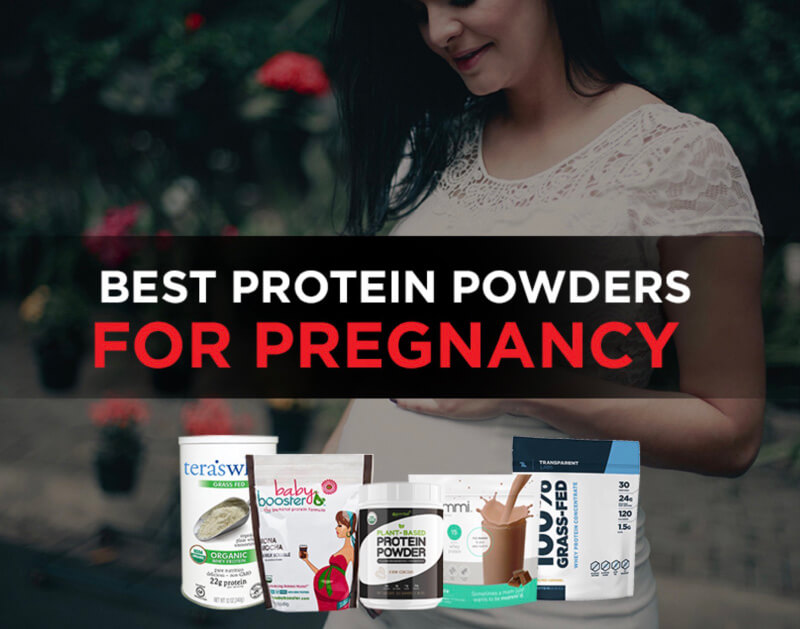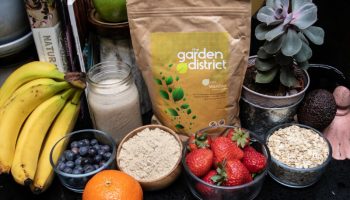Pregnant women always need a lot of protein and nutrients for the health of both them and their babies. In this case, protein powders are an excellent solution due to their rich nutrition and convenience.
Nonetheless, because not all products are safe for pregnancy, Nogii have made a list of the best protein powders for pregnant moms and notable points when consuming these types of products.
Scroll down and check them out!
Can you take protein powder while pregnant?
Because of the necessity of protein for expectant mamas, hundreds of protein powder specifically for them have flooded the market. But are they safe for moms and babies? Some are, but some are not.
For example, thanks to its food origin, fermented organic vegan protein is totally safe for pregnancy. Moreover, pregnant moms usually suffer from bloating and digestive disturbance, so easy-to-digest fermented ingredients (especially those with probiotics) are perfect.
However, there are poor-quality protein powders that are full of harmful additives such as artificial flavours, food dyes, preservatives. In rare cases, there are products that are generally good yet contain allergens and unsuitable substances for a small group of women.
As a result, it is best for you to ask for advice from your doctor before you try a protein powder product since every female has a different health condition and body.
Note: We will mention the particular ingredients in protein powders that you need to avoid in the FAQ section of this article.
Best protein powder for pregnancy
1. Tera’s Whey Organic Protein – model number: 850628002548

This tiny treasure provides us with up to 21 grams of pure whey protein per serving. The organic whey protein extracted directly from goat milk has nothing to do with antibiotics and growth hormones (rBST and rBGH).
In addition to all nine essential amino acids, the product also comes with nearly 5 grams of Branched Chain Amino Acids (BCAAs) and has no gluten, soy, GMOs, or artificial additives.
Not only prenatal moms, but anyone can use this shake as a healthy snack at home or on trips. The smell of natural Madagascar Bourbon Vanilla is exceptionally fresh and ideal for mixing with other flavours such as cacao, fruit, or syrup to improve the taste.
It is a bit expensive, but we think it is worthy.
Pros
- Provide up to 21 grams of protein each serving.
- Certified by Kosher and USDA!
- Low in carbs and glycemic index.
- Free from artificial sweeteners.
- No rBGH/rBST.
- GMO-free, gluten-free, soy-free, nut-free.
Cons
- Not budget-friendly
- Quite a small package size.
- No warranty.
2. Norcal Organic Whey Protein Powder – model number: 609465627618

With various reputable certificates, the Norcal Organic brand ensures its products to be not only safe but also nutritionally-complete.
Without unhealthy hormone treatments, bleach or acid process included in this protein powder production, expectant moms can feel assured about the health safety of themselves and their babies.
Moreover, the product is packaged with all non-essential and essential as well as branched-chain amino acids like Valine, Isoleucine, Leucine, and many more.
Unfortunately, the quantity of protein per serving is inferior to many other products. But there are slight offsets from glutathione (a booster for both immune system and lean muscle) and a number of other good protein forms.
To sum up, Norcal Organic protein powder is still a recommended choice for prenatal mothers.
Pros
- Accredited by numerous trusted agencies
- Safe and pure ingredient
- Supply glutathione and many other nutrients
Cons
- The price is too high
- Provide little protein for a small serving
- May cause uncomfortable symptoms in your stomach
3. Baby Booster Prenatal Vitamin Supplement Shake – model number: POU103

Since what you eat affects your baby, the Baby Booster company creates a product that alleviates the worry of wrong protein intake for pregnancy.
Designed for pregnant women, the powder contains no GMO, caffeine, gluten, or soy. It comes up with all-natural ingredients and free of the noxious chemicals and artificial sweeteners or preservatives.
The innovative low-carb and rich-protein formula features enough DHA and protein that enhances both the intellectual and physical development of your baby, particularly in the last trimester.
For the amount of 20 grams of protein each serving, you may want to drink two cups of this protein powder daily as a part of your breakfast or a snack in the late afternoon.
Pros
- Innovative nutrient formulation.
- Organic and safe ingredients.
- Have a warranty policy.
- Full nutrition for baby’s intellectual and physical development.
Cons
- Clumpy and chalky
- Nasty aftertaste
- Expensive
4. Pure Food: Plant-based Protein Powder with Probiotics

Each of this plant-based protein powder spoon offers 62 calories with 1 gram of non-saturated fat, 4.5 grams of carbohydrates (including under 1 gram of sugar and 2 grams of fiber), and 10 grams of protein.
Additionally, each scoop also contains 3% of sodium, 15% of iron, 8% of magnesium, and 2% of calcium of your daily intake.
There are no synthetic but only organic ingredients including brown rice protein, pea protein, hemp protein, stevia leaf, lucuma fruit, vanilla, mesquite, and the probiotic bacteria called Bacillus coagulans (these produce lactic acid).
Apart from no cholesterol, Pure Food powder contains no harmful substances for pregnancy such as egg, soy, gluten, dairy, GMO, corn, grains, additives, xanthan gums, or added sugar.
Nonetheless, the bad point is the producer leaves not much nutrition information on the label, even the number of probiotic bacteria and vitamins per serving.
Pros
- No cholesterol, artificial ingredients, additives, egg, soy, gluten, GMOs, etc.
- Contain probiotics for easy digestion
- High in iron
Cons
- Expensive
- Lack of nutrition info
- Plant-based protein may contain many heavy metals
5. Mommi – PreNatal Protein Shake

Formulated and recommended by OB/GYNs, Mommi – PreNatal Protein Shake is the perfect pregnancy protein powder for both prenatal and nursing moms. This protein powder is not only delicious but also healthful.
Break down the ingredients, we find the essential vitamins and minerals such as iron, calcium, vitamin C, l-methylfolate/folate, and so on. Unluckily, there is no DHA there.
One serving supplies moms with 15 grams of protein and just an unremarkable calorie amount and no gluten, GMO.
Furthermore, its price is affordable, and it is also easy to blend with other foods and drinks.
Pros
- Non-GMO and gluten-free
- Easy to dissolve
- Tasty
- Reasonable price
- Contain soy lecithin that prevents clogged ducts and mastitis as well as l-methylfolate – the natural version of folic acid
- 100% vitamins (including B-6), minerals, and nutrients
Cons
- Not relevant whether ingredients are organic or not
- Difficult to re-seal bag
- Perhaps too sweet to many women
6. Protiva Pregnancy Safe Protein Powder

Protiva collagen protein powder is clinically-tested and proven to be safe and helpful for the fetus and its mom. The company invented a patented formulation that consists of 15 grams of collagen protein, which is perfectly combinable with any prenatal vitamins and micronutrients for multiple positive effects.
Plus, it contains no artificial sweeteners, gluten, and preservative so you can keep your blood sugar balanced while still providing your baby with sufficient nutrition.
In fact, expectant mamas, who have used the product, can boost their metabolism and immune system, maintain healthy skin, tendon and ligament tone throughout their pregnancy.
The protein powder features versatile mixability with many other types of ingredients like smoothies.
Pros
- Reputable brand
- Tested and proven
- Use collagen-protein, especially great for pregnancy
- All-natural ingredients
- No gluten, no preservative, no allergen
- Boost metabolism and other body functions
Cons
- Quite flavourless
- Rather sweet.
How To Choose a Safe Protein Powder For Pregnancy
Whether you are nursing or a pregnant mother, it is necessary for you to seek protein powders that meet the below requirements for your baby safety:
Protein quality: many studies and nutritionists have discovered that types of animal-based protein feature less heavy metals in comparison with plant-based proteins. Thus, when it comes to the safety of pregnancy, soy protein is inferior to meat protein of animals.
Free from sweeteners and GMO substances: Sweeteners (like lactose or gluten) can result in overweight and various hormonal issues. Meanwhile, pregnant women have to keep a balanced hormone level to prevent post-partum stress and weight excess.
Non-additive and chemical-free: These substances are potentially harmful to your child’s overall health and development. In the worst situation, the child may even get congenital disabilities.
Besides, there are many other unhealthy ingredients that you need to avoid. To make this list shorter, we indicate all of what you need to get rid of during pregnancy in the FAQ section.
Bonus nutrients:
- DHA
- Iron
- Calcium
- Amino acids and folic acids
- Iodine
- Vitamin A
- Vitamin B
- Vitamin C
- Vitamin D
- Vitamin E
- Biotin
- Probiotic
Last but not least, you ought to go for famous brands with trusted certificates from reputable agencies such as USDA, Kosher, etc.
Our Best choice
After we have considered all the pros and cons of each product meticulously, we vote Baby Booster Prenatal Vitamin Supplement Shake as the best protein powder for expectant mothers.
This product comes from a well-known brand with organic and safe ingredients. Its unique formulation contains no harmful substances yet full of beneficial nutritions that effectively improves the overall health of both moms and babies.
As we see, not many products in the current market are of such great quality, especially considering the precious amount of DHA.
Regardless of its high price and not-so-comfortable flavor, the product is nearly perfect!
FAQ
Does whey protein affect fertility?
Protein is a basic factor for human body operation and your protein requirement depends on your daily activities and your body weight.
Whey protein, which supports enzyme and cell production as well as hormonal balance, is beneficial to fertility.
Furthermore, in protein sources such as meat, eggs, milk, seafood, so on, there is a special mineral called Selenium that boosts fertility in either gender.
To sum up, whey protein has positive impacts on fertility, especially if taken according to the instruction of a nutritionist.
How much protein should a pregnant take daily?
In spite of the increased protein necessity during pregnancy, expectant mothers ought to note that overdose of protein is negative to a developing fetus.
Be aware that protein powder is not your only source of protein intake. If you have been eating a large amount of protein-rich foods already, the redundant amount of protein from protein powder may elevate your likelihood of premature birth, loss of birth weight, and inferior growth.
Researchers claim that the maximum protein intake should not exceed 20% of calories to prevent any potential risks. The standard outlines for a pregnant woman’s calorie requirements are as below:
- 1,800 calories per day for the first trimester
- 2,200 calories per day for the second trimester
- 2,400 calories per day for the third trimester
That said, your protein consumption must not be over 90/110/120 grams per day in the first/second/third trimester.
To simplify the rule, one or two servings daily are okay when protein powder is not your single protein source. But this should also depend on your daily activity intensity. If you feel you need more protein, increasing your protein intake a bit is fine.
What supplements should you avoid during pregnancy?
Heavy metals in proteins: By nature, nearly all proteins contain several types of heavy metals. Plant-based proteins often feature more heavy metal and worse quality proteins. On the contrary, animal-based proteins are remarkably lower in heavy metal, particularly when it comes to whey as well as whey isolate proteins.
Therefore, you had better read the ingredients label carefully.
Artificial sweeteners: Many specialists warn pregnant women against synthetic sweeteners such as saccharin because they may result in headaches, overweight, and even depression.
Additives: The most unhealthy ingredients in protein powder are their additives.
Especially products designed for athletes regularly consist of inappropriate things for pregnant or nursing women such as additional caffeine, psyllium, creatine, coconut flour, etc.
Moreover, protein powder for bodybuilders may also supply too much protein, stimulants, and herbs for pregnant moms. So watch out the additives.
Gluten: This can affect pregnant women in many aspects such as unstable moods or hormone imbalance.
Xanthan gum: Xanthan gum as well as other related thickeners can bring about gas issue because of their soy or corn ingredient.
Plant-based oil: This includes trans fats, which makes pregnant women gain weight and leads to unhealthy lifestyle.
Soy protein: In fact, pure soy protein is safe to people. Nonetheless, most of current soy is GMOs and likely to create hormonal troubles.
Milk solids: Commonly, milk powders and milk solids are found to be very high in lactose sugars that cause upset digestion and constipation.
Plus, you will need to avoid GMO, chemical, preservatives, and other specific substances that your doctor suggest or you are allergic to.
Conclusion
Hopefully, after this article, all of not only pregnant moms but also breastfeeding mothers can choose the right protein powder for themselves and their babies.
Bear in mind what we have told you about beneficial and harmful ingredients in protein powders. It is extremely crucial to control what you eat during your pregnancy for the intellectual and physical development of your child.
If you still have questions about types of ingredients in particular and protein powder in general, feel free to ask us in the comment section.
Thanks for reading!





